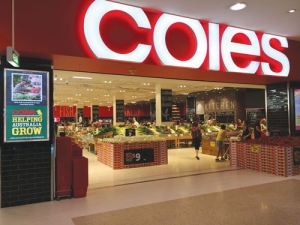Australian supermarkets have been in the gun for years for the way they treat suppliers and farmers.
Supermarkets are a key channel to the dairy industry’s main market – Australia.
Dairy Australia figures show that of 60% of production sold at home, 58% of product volume and 52% of drinking milk is sold via the grocery channel.
Farmers may be forgiven for imagining the Coles or Woollies head office bosses smoking expensive cigars and stroking white cats while they crush suppliers and rake in the dollars.
Australia’s major retailers are profitable by global standards: Woolworths’ 2014 earnings margin of 8% is double the average of its international peers (4.2%), and Coles’ margin of 5.3% is also relatively high.
But increasingly these two big players aren’t getting things all their own way. Coles and Woolworths are dominant, but the “80% share” figure usually bandied about is overstated. Analysis from Nielsen and Moody’s released in March put the duopoly share of shopper spending at 60% by value for FY2014.
Duopoly perhaps not, but still hugely influential. Then there’s German interloper Aldi steadily increasing its share to 8%, nipping at Coles and Woolies with its offering to save shoppers’ money.
Moody’s expects Aldi’s east coast growth to continue at 5-6% in store numbers a year over the next five years -- about double that of Woolworths and Coles who will keep getting higher sales out of existing floor space.
Last month Woolworths chief executive Grant O’Brien quit, and there was news of 1200 job cuts, indicating the pressure on this previously unassailable retailer. Its shares have dropped 30% in the past 12 months, blamed on lacklustre sales results, particularly in non-supermarket divisions.
In supermarket sales Woolies has lost its edge: same store sales growth is virtually flat, and rivals Coles and Aldi have outmanoeuvred and outperformed the market leader.
Before O’Brien quit Woolies unveiled a three-year strategy, including the funding of price cuts aimed at fending off the hard discounter Aldi, Costco chain and the potential new German entrant Lidl. They have also needed to counter Coles’ ‘Down Down’ mantra.
As the dust was settling around Woolworths last month, Coles announced a massive review of its own ranges, including an overhaul of products that rely on discounts to get sales. Coles says the 24 month review will clear shelf space for new, innovative brands. It sounds good, and it doesn’t rest completely on selling things dirt-cheap, but any brand owners not growing sales will urgently focus on performance.
With a history of taking leads from UK supermarket trends, our retailers are watching the struggles of Tesco, Morrisons, Sainsbury’s and Asda as the same German discounters re-shape the sector and go mainstream. Cash-strapped UK shoppers, after the GFC, at first tried the discounters, warming to the offering. Attempts at price matching by the big guys have resulted in a loss in sector where profit margin is likely to be permanent.
Moody’s rating agency said in its 2014 report, “Consumers are voting with their feet and are more inclined to do their primary grocery shopping at discounters than at any time in the past. We don’t anticipate the value or quality perception of the discounters will deteriorate as disposable incomes improve and as a result we believe Aldi and Lidl will continue to gain market share.”
In Australia, both the locals will be looking for ways to stay ahead of the disruption threatened by Aldi (and potentially Lidl’s) simplified, streamlined business models.
So while the Coles and Woolies dominance has been challenging, will a future with more players be better for suppliers and farmers? Increased competition is good, right? The question is who will it really be good for? Consumers have essentially enjoyed zero food price inflation over the past five years, as Coles and Woolies have slugged it out on price, egged on by Aldi’s growth.
Enter Lidl, and the imperative to keep prices low to compete with another hard discounter would be even stronger.
At supermarkets, everyday staple items like milk and cheese will remain at the core of value-focussed strategies to protect and increase market share. Growing volumes and unit values for dairy products in this environment will get tougher.
Product and marketing innovation will be needed for the domestic dairy market to continue to be a stable alternative to the export trade.
• Jo Bills is a director of Melbourne-based firm Fresh Agenda.
(www.freshagenda.com.au)

















